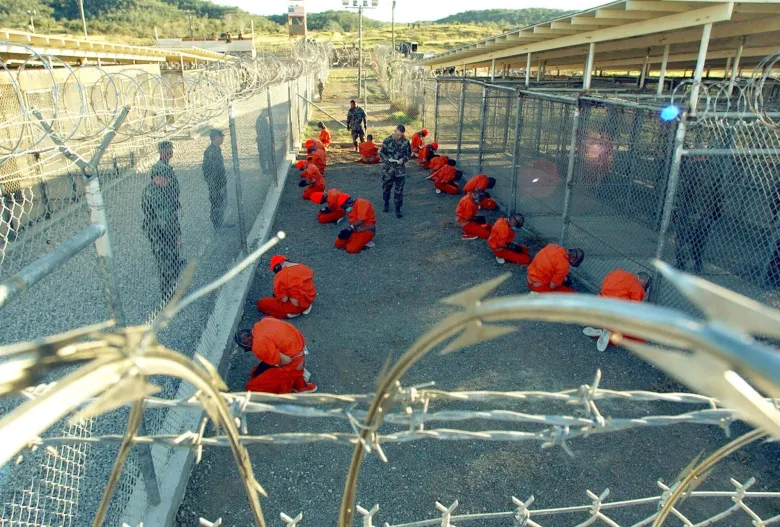Gitmo’s Permanent Chains
UNITED NATIONS, 17 Jul 2023
Seymour M. Hersh | ScheerPost – TRANSCEND Media Service
A UN Report Finds Continued Abuses at the US Prison
7 Jul 2023 – Now comes yet another little-noted UN report on the continuing excesses and inhumanity at Guantánamo Bay, the post-9/11 US military prison that only two decades ago set the standard for war crimes—a standard that is now being eclipsed by the war in Ukraine. The report’s author is Fionnuala D. Ní Aoláin, the United Nations special rapporteur on the promotion and protection of human rights while countering terrorism, a law professor at the University of Minnesota and the Queens University in Belfast, and an experienced human rights investigator. She based her report on a four-day visit to the island prison last February. She was given extraordinary access to the thirty-four prisoners who then remained in captivity, most of whom have been found guilty of nothing more than being in the wrong place in Afghanistan at the wrong time. Thirty prisoners remain in Guantánamo today, sixteen of whom have been cleared for release.
Ní Aoláin is a brilliant observer. She is the first UN official ever to be allowed to visit the prison. She acknowledges that the basic living conditions of the remaining prisoners have been much improved in the recent years as the population of detainees dwindled, but those improvements, she writes, are offset for those still jailed by the “cumulative effects of past rendition, disappearance, incommunicado detention, systematic torture and ill treatment, and continued detention,” which “have had severe and long-term psychological and physical consequences.” She is especially critical, as were past observers, of what she found to be “serious structural and institutional deficiencies in present care.” She links those concerns with her unique observation that the medical and psychiatric care available “may trigger for some detainees previous experiences of torture, cruel, inhuman, and degrading treatment.” She noted that the US government’s “failure to provide such care exacerbates the impact of the horrific treatment or punishment they previously suffered and prolongs the consequences.”
In her conclusion, Ní Aoláin writes that every current or prior prisoner she met with speaks bitterly of the public perception that they are “the worst of the worst,” despite the fact that most of them have never “been charged, let alone convicted of a single crime.” She adds: “None of the former detainees have been compensated by the US Government for the systematic crimes of extraordinary rendition, torture, cruel, inhuman, and degrading treatment, and arbitrary detention.”
Her comprehensive report made little news in America, aside from a summary by reporter Carol Rosenberg of the New York Times, who has made Guantánamo and its excesses her beat, and an Associated Press report that ran in the Miami Herald. I was unable to reach Ní Aoláin, who is now on a month-long assignment, but last week she gave a brief interview to PBS NewsHour. Asked why she believed the US government “should apologize to the detainees responsible for the deadliest attack in US history,” she answered: “Those who tortured [at Guantánamo and elsewhere] betrayed the rights of victims, because they ensured you couldn’t have a fair trial. . . . In fact, victims of terrorism are due an apology for torture because it was the very torture that was done, sometimes in their name, that has prevented them from actually ensuring the fulfillment of their rights.
“Let me be clear. Torture is the most egregious and heinous of crimes. Even in situations of war we don’t accept that people can torture. We say this to Russia. We say it to China. We say it to many, many countries across the globe. . . . You are not allowed to torture.”
The Biden administration, obviously aware that Americans by and large care little about Guantánamo and the souls who have been wrongfully imprisoned there, left the response to UN Ambassador Michèle Taylor. Her reply to the report essentially said Ní Aoláin had it all wrong. “We are committed to providing safe and humane treatment for detainees … in full accordance with international and US domestic law. Detainees live communally and prepare meals together; receive specialized medical and psychiatric care; are given full access to legal counsel; and communicate regularly with family members.”
President Biden issued a statement last month declaring his administration’s opposition to “all forms of inhumane treatment” and its commitment to “eliminating torture and assisting torture survivors as they heal and in their quests for justice.” He cited abuses by the Russian military in Ukraine and inside Russia itself, the government of Bashar al-Assad in Syria, and credible reports of “cruel, inhumane, and degrading punishment” by the North Korean government.
There is an account in Ní Aoláin’s report that depicts for me the senseless horror of Guantánamo, past and present, most vividly. Look again at the photo at the top of this article. It foretold the coming inhumanity for the early wave of alleged Al Qaeda terrorists. Many of those prisoners, as we now know, were grabbed in Afghanistan by CIA officers and Special Forces troops out of American anger and fear in the aftermath of 9/11. Some were bought from local captors for fees ranging up to many thousands of dollars. Evidence of guilt was not a requirement in those early days.
Here is Ní Aoláin’s angry account—written in the third person; she is “the SR”—of how America flew those prisoners cleared for release in recent years to their new home countries:
The SR is profoundly concerned that men cleared for transfer, against whom no crime has been charged and who are security cleared, continue to be shackled, blindfolded, and have their sensory organs covered up during long airplane transports. The SR was informed that during transfer from the detention facility to the aircraft, the detainee’s hands and legs are restrained to ensure the safety of both US Government personnel and the detainee. Once a detainee is transferred to the custody of the US Air Force Air Mobility Command Detainee Movement Team, the team determines the restraints required for safety purposes. The SR finds such restraints and travel to be traumatic and retraumatizing and engages both inhuman and degrading treatment. She is further concerned that the Detainee Movement Team may be ill-prepared to tailor their treatment of the men in full respect of their human rights. She underscores that the very fact of the detainee’s transfer indicates the security of their release. She finds the current modalities of travel constitute inhuman and degrading treatment under international law and are unjustified given the status of individuals who have been released following long-term arbitrary detention, many for over two decades. Although she was informed that all detainee transfers are accompanied by a medical team and that detainees are free to use the restroom onboard and eat prepared meals absent a security risk, she expresses serious concern, that several former detainees with whom she spoke were not given such liberties during flight, opening the door to further human rights abuse.
Ní Aoláin was assured that the freed prisoners would have access to US embassies and consulates in the countries to which they were deported, and that American officials would check on their status in their new communities. In practice, she writes, the freed prisoners were unable to make contact with any American diplomats and she knew of one case in which a former prisoner was held in “incommunicado detention” by his host country for attempting to reach an American diplomat. It was even worse in two other host countries, where the returned prisoners were put under house arrest and in one case even tortured.
All in all, as the UN’s special rapporteur did not say, it could not be worse for those souls if they were found not guilty of wrongdoing and cast into hell for the rest of their days.
_____________________________________________
 Seymour M. Hersh’s investigative journalism and publishing awards include one Pulitzer Prize, five George Polk Awards, two National Magazine Awards, and more than a dozen other prizes for investigative reporting. Hersh won a National Magazine Award for Public Interest for his 2003 articles “Lunch with the Chairman,” “Selective Intelligence,” and “The Stovepipe.” In 2004 he exposed the Abu Ghraib prison scandal in a series of pieces; in 2005, he again received a National Magazine Award for Public Interest, an Overseas Press Club award, the National Press Foundation’s Kiplinger Distinguished Contributions to Journalism award, and his fifth George Polk Award, making him that award’s most honored laureate. He lives in Washington DC.
Seymour M. Hersh’s investigative journalism and publishing awards include one Pulitzer Prize, five George Polk Awards, two National Magazine Awards, and more than a dozen other prizes for investigative reporting. Hersh won a National Magazine Award for Public Interest for his 2003 articles “Lunch with the Chairman,” “Selective Intelligence,” and “The Stovepipe.” In 2004 he exposed the Abu Ghraib prison scandal in a series of pieces; in 2005, he again received a National Magazine Award for Public Interest, an Overseas Press Club award, the National Press Foundation’s Kiplinger Distinguished Contributions to Journalism award, and his fifth George Polk Award, making him that award’s most honored laureate. He lives in Washington DC.
© 2023 Seymour Hersh
Tags: Cuba, Enhanced Interrogation, Guantanamo, Invasion, Occupation, Official Lies and Narratives, Pentagon, Rogue states, Torture, US empire, USA, United Nations, War crimes
DISCLAIMER: The statements, views and opinions expressed in pieces republished here are solely those of the authors and do not necessarily represent those of TMS. In accordance with title 17 U.S.C. section 107, this material is distributed without profit to those who have expressed a prior interest in receiving the included information for research and educational purposes. TMS has no affiliation whatsoever with the originator of this article nor is TMS endorsed or sponsored by the originator. “GO TO ORIGINAL” links are provided as a convenience to our readers and allow for verification of authenticity. However, as originating pages are often updated by their originating host sites, the versions posted may not match the versions our readers view when clicking the “GO TO ORIGINAL” links. This site contains copyrighted material the use of which has not always been specifically authorized by the copyright owner. We are making such material available in our efforts to advance understanding of environmental, political, human rights, economic, democracy, scientific, and social justice issues, etc. We believe this constitutes a ‘fair use’ of any such copyrighted material as provided for in section 107 of the US Copyright Law. In accordance with Title 17 U.S.C. Section 107, the material on this site is distributed without profit to those who have expressed a prior interest in receiving the included information for research and educational purposes. For more information go to: http://www.law.cornell.edu/uscode/17/107.shtml. If you wish to use copyrighted material from this site for purposes of your own that go beyond ‘fair use’, you must obtain permission from the copyright owner.
